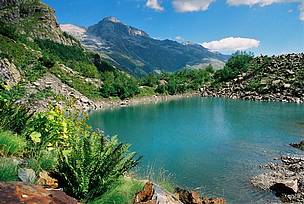UNESCO urges limits to ski resort expansions in the Western Caucasus
The UNESCO World Heritage Committee has expressed serious concern over the transfer of land plots around the Sochi national Park and the Sochi reserve to private companies associated with local ski resorts for further development and its potential impact on the Western Caucasus World Heritage site.

The Western Caucasus.
The Committee’s decision, adopted on last Thursday at a meeting in Bahrain, comes as some expansion plans are already underway in plots bordering the World Heritage site, and extending further along the Mzymta river valley, where construction of ski infrastructure could threaten ecological integrity across the region. These include expansion of the Rosa Khutor ski resort; Gazprom’s plans to build ski infrastructure in the Grushevyj ridge; and the Ministry of North Caucasus Affairs’ plans to build the Mineralnye Vody — Adler road, which would pass through the Caucasian Reserve and risks cutting the Western Caucasus almost completely from its surrounding mountain system.
Igor Chestin, Director, WWF-Russia, said:
“For several years, WWF-Russia has been raising the alarm over the damaging impact extensive development of ski resorts in the Krasnaya Polyana region could create on the Western Caucasus. With the expansion of ski resorts already underway in some areas, we hope the World Heritage Committee’s decision marks a first step toward limiting the threat and helps ensure that no further activity is undertaken without robust environmental assessments. Unsustainable expansion of resorts risks completely destroying the upper reaches of the Mzymta river, home to habitats and migration corridors for species such as the brown bear, red deer and Persian leopard among others, and fragmenting the Caucasian Reserve irrevocably.”
In line with the Committee’s decision, WWF is calling for an environmental impact assessment for all existing and proposed expansion plans in and around the World Heritage site to be conducted in accordance with the criteria developed by the International Union for Conservation of Nature (IUCN). In particular, WWF urges stakeholders to adopt the IUCN "Sport and Biodiversity guide" which aims to regulate the work of the sports sector in the context of its impact on nature and promote the assessment of the environmental impact of large sports facilities. Developed jointly with the International Olympic Committee, the guide aims to help preserve and restore biodiversity in Olympic game venues, and highlight the role of nature in maintaining a healthy lifestyle.
The Western Caucasus site was listed as a UNESCO Natural World Heritage site in 1999. It includes the Caucasian state reserve, the "Big Tkhach" natural park, the "Buynyi Ridge", "the upper reaches of the Tsitsa river " and "the upper reaches of rivers Pshekha and Pshekhashkha".
Source: World Wildlife Fund
- 266 reads
Human Rights
Ringing FOWPAL’s Peace Bell for the World:Nobel Peace Prize Laureates’ Visions and Actions

Protecting the World’s Cultural Diversity for a Sustainable Future

The Peace Bell Resonates at the 27th Eurasian Economic Summit

Declaration of World Day of the Power of Hope Endorsed by People in 158 Nations

Puppet Show I International Friendship Day 2020

